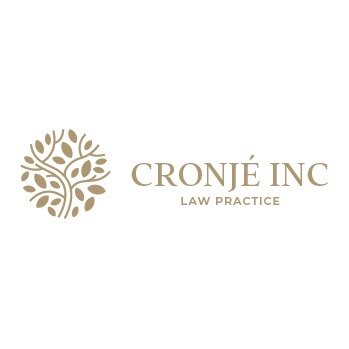Best Art & Cultural Property Law Lawyers in Namibia
Share your needs with us, get contacted by law firms.
Free. Takes 2 min.
Or refine your search by selecting a city:
List of the best lawyers in Namibia
About Art & Cultural Property Law in Namibia
Art & Cultural Property Law in Namibia encompasses legal frameworks that govern the protection, management, and ownership of cultural artifacts, artworks, heritage sites, and other culturally significant properties. This area of law aims to safeguard Namibia's rich cultural heritage and ensure that cultural assets and artistic expressions are preserved, respected, and rightly attributed. As the artistic and cultural landscape continues to evolve, laws and regulations are constantly updated to respond to new challenges and opportunities in the preservation and commercialization of cultural and artistic properties.
Why You May Need a Lawyer
There are several situations where individuals, organizations, or communities might require legal assistance in the realm of Art & Cultural Property Law in Namibia. These include:
- Disputes over the ownership or provenance of cultural artifacts.
- Protection of indigenous art and cultural expressions from unauthorized use.
- Navigating issues related to cultural heritage sites, such as land use or redevelopment.
- Assistance in the drafting and negotiation of contracts related to the sale or donation of art.
- Legal measures against the theft or illegal trafficking of cultural properties.
- Guidance on compliance with international treaties and conventions regarding cultural property protection.
- Representation in court or before governmental agencies in cultural property disputes.
Local Laws Overview
In Namibia, the legal framework for art and cultural property is structured by both national legislation and international conventions which the country is a part of. Key aspects include:
- The National Heritage Act: This act provides the foundation for the protection and management of heritage and cultural resources. It outlines the procedures for designating heritage sites and regulating their use.
- Copyright and Related Rights Act: This legislation protects the intellectual property of artists and creators, ensuring they have rights over their creations.
- Customary Law: Recognized as a legal source in Namibia, customary laws often play a role in managing communal property and cultural practices.
- International Treaties: Namibia is a signatory to several international conventions, such as the UNESCO Convention on the Means of Prohibiting and Preventing the Illicit Import, Export, and Transfer of Ownership of Cultural Property.
Frequently Asked Questions
1. What is cultural property?
Cultural property refers to objects, sites, and practices that are considered significant to the cultural heritage of a community or nation. This can include artworks, artifacts, manuscripts, monuments, and traditional crafts.
2. How are cultural properties protected under Namibian law?
Cultural properties are protected through various national laws like the National Heritage Act and international agreements that Namibia is a part of, such as UNESCO conventions. These laws offer guidelines for the preservation, documentation, and legal protection of cultural properties.
3. What should I do if I discover an artifact or cultural property?
If you discover an artifact, it is crucial to report it to the National Heritage Council immediately. Handling or moving the object without permission can lead to legal consequences.
4. Can art be taken out of Namibia?
The export of art and cultural property from Namibia may require permits from the relevant governmental authorities, particularly if the item is of significant cultural heritage value.
5. What are the penalties for illegally trafficking cultural property?
Penalties can include heavy fines, imprisonment, and the confiscation of the illegally trafficked objects. The specifics depend on the severity and nature of the violation.
6. How are indigenous artistic rights protected?
Indigenous artworks are protected under intellectual property laws, including copyrights, and receive additional protection to ensure that these art forms are respected and not misused or misrepresented.
7. Can I claim ownership of artifacts found on my property?
Ownership claims on discovered artifacts can be complex as they often default to the state or community. You would need to follow legal procedures as outlined by the National Heritage Act.
8. How can I verify the authenticity of a cultural artifact?
To verify authenticity, consult experts or organizations specializing in cultural artifacts or art appraisals. Legal documentation and provenance records are crucial in establishing authenticity.
9. What legal measures exist for digital art and digital heritage?
Digital art is covered under intellectual property laws, allowing artists to protect their rights. Similarly, digital heritage is gaining recognition, with initiatives focused on its preservation and legal protection evolving.
10. How is art-related contractual negotiation handled?
Art-related contracts, such as for the sale, commission, or exhibition of artworks, should be detailed and clear in outlining the rights and responsibilities of all parties involved. Legal advice is recommended for these negotiations.
Additional Resources
Several resources can be useful for those seeking more information or needing legal assistance related to Art & Cultural Property Law in Namibia. Consider contacting the following:
- National Heritage Council: The primary body for heritage management and inquiries related to cultural properties.
- Namibian Society of Composers and Authors of Music (NASCAM): Offers resources related to copyright and intellectual property for artists.
- Ministry of Education, Arts and Culture: Provides support and information on cultural policies and regulations.
- Legal Practitioners' Bodies: These include organizations such as the Law Society of Namibia, which can help find qualified legal professionals.
Next Steps
If you need legal assistance in Art & Cultural Property Law, consider these steps:
- Identify and clearly define your legal needs or issues.
- Compile all related documentation or evidence that may support your case.
- Consult with a legal professional specializing in arts and culture. The Law Society of Namibia is a good starting point for finding qualified lawyers.
- Stay informed about updates in laws and policies regarding art and cultural property by following related organizations and attending forums or workshops.
Lawzana helps you find the best lawyers and law firms in Namibia through a curated and pre-screened list of qualified legal professionals. Our platform offers rankings and detailed profiles of attorneys and law firms, allowing you to compare based on practice areas, including Art & Cultural Property Law, experience, and client feedback.
Each profile includes a description of the firm's areas of practice, client reviews, team members and partners, year of establishment, spoken languages, office locations, contact information, social media presence, and any published articles or resources. Most firms on our platform speak English and are experienced in both local and international legal matters.
Get a quote from top-rated law firms in Namibia — quickly, securely, and without unnecessary hassle.
Disclaimer:
The information provided on this page is for general informational purposes only and does not constitute legal advice. While we strive to ensure the accuracy and relevance of the content, legal information may change over time, and interpretations of the law can vary. You should always consult with a qualified legal professional for advice specific to your situation.
We disclaim all liability for actions taken or not taken based on the content of this page. If you believe any information is incorrect or outdated, please contact us, and we will review and update it where appropriate.
Browse art & cultural property law law firms by city in Namibia
Refine your search by selecting a city.












